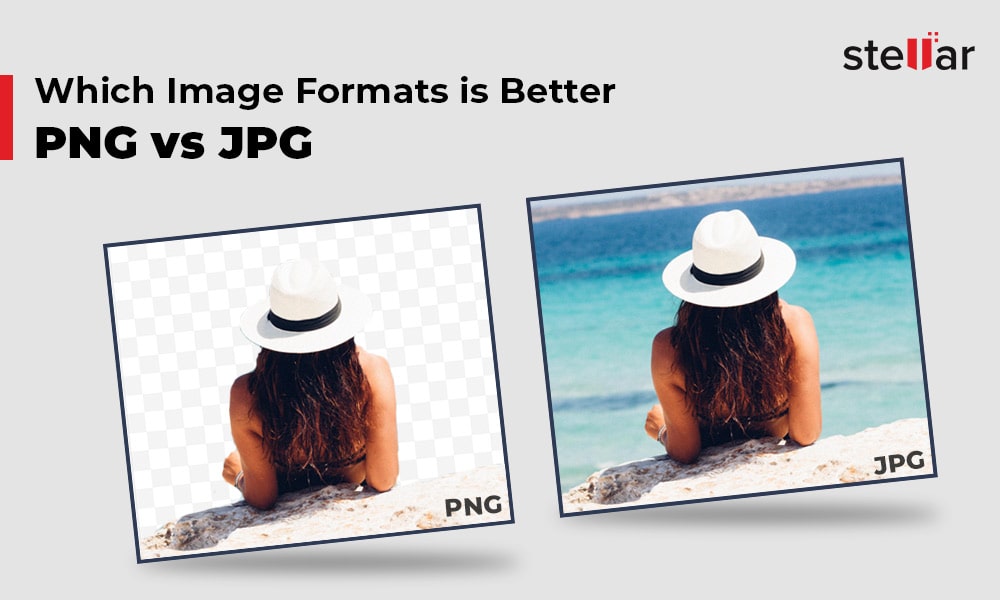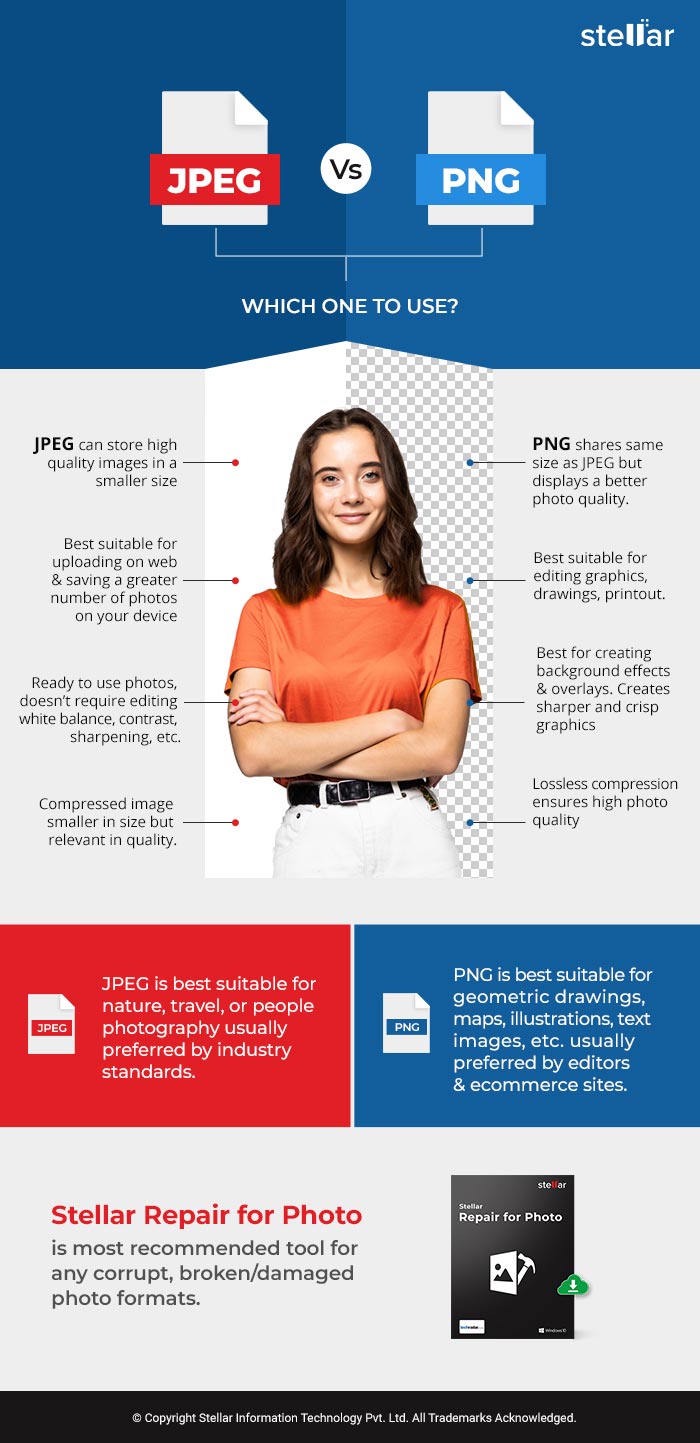Often, it’s difficult to decide between JPEG vs PNG image formats. More so because both seem to have desirable qualities. You may like PNG for its high-quality compression but can’t ignore that JPG is faster to load and occupies less space.
Whether you need to edit, share online, print, or archive, choosing the right photo format is crucial. So if you are having a problem in deciding between JPEG and PNG, this post guides you to make the right choice.

JPEG or Joint Photographic Experts Group is a compressed image format that uses .jpg or .jpeg as the file extension. The format is universally preferred as it compresses the file without compromising image fidelity. The compression is hardly noticeable, especially in nature and people photography. With JPEG, you can store a high-quality image in a smaller size, thus saving space on your drive. Besides, the format is considered optimal for photography as it brings fine color and tone in the images. Almost all DSLRs, digital cameras, smartphones, etc., record photos in JPEG format. Like the RAW file format of cameras, JPEG doesn’t require much processing.
It is commonly used for web, printing, or archiving photographs. You can easily upload or share JPEG/ JPG photos on email, Facebook, Flickr, Vimeo, Instagram, WhatsApp, Tumblr, etc.
However, the format is not appropriate for saving graphics, texts, or line drawings. Also, if you want to edit photos, don’t save them in JPEG format. Multiple editing or processing of JPEG image results in image data loss.
Key benefits of JPEG/ JPG format
- Occupy less space on storage drive/media
- Widely supported by photo viewers, editing tools, and devices
- Photos originally shot in JPEG format don’t require much work in terms of white balance, contrast, sharpening, etc.
- Quick to download and share across devices, networks, and online applications
PNG or Portable Network Graphics file format uses a .png file extension. It is a raster graphics image format, which supports lossless data compression.
PNG is the best format for photos that contain graphics, lines, edges, drawings, or text, such as in logos, architectural blueprints, screenshots, etc. A PNG file of the same size as JPEG will be sharper and display better photo quality. Unlike JPEG format, PNG supports a transparent background. You can remove or add effects in the background of your images.
But a photo saved in PNG format will be significantly larger than JPEG. Thus, it occupies more space in your drive compared to a JPEG file. Plus, PNG files take longer to download.
Key benefits of PNG format
- Lossless compression ensures high photo quality
- Creates sharper and crisp graphics
- Best for creating background effects and overlays
- Supports transparent background

Both JPEG and PNG file format have their advantages and drawbacks. Which is better depends upon the kind of photograph and how you plan to use it.
Usually, industry standards follow JPEG format for regular photos and PNG for geometric drawings, maps, illustrations, text images, etc.
For nature, travel, or people photography, JPEG would be an ideal format. While for creative portfolios or product photos for posting on e-commerce websites, you can choose PNG, which supports a transparent background.
You may like: Highest Quality Image Format for Photographers – JPEG, TIFF, PNG, PSD, or RAW
PNG vs JPG for Editing
The high-resolution PNG image files contain more image data than JPEG and thus apt for editing. Professionals prefer PNG over JPG for editing graphics, drawings, product photos, logos, etc., in Photoshop, PaintShop Pro, CorelDraw, and others. PNG format is best for getting transparent backgrounds or shadow effects in images.
PNG vs JPG for Archiving
Archiving or storing pictures in JPEG format helps to save more photos on your device. PNG files are large and take up more storage space. So you can archive or backup thousands of your precious photos in JPEG format on any drive.
You may like to read: Recover deleted photos from any device
PNG vs JPG for Printing
PNG files are high-resolution images with better color depth, so they deliver good quality printouts using home or office printers. Contrary, JPEG photos may get blurry or show loss of color in printing output.
However, professionals don’t prefer PNG for commercial printing of posters, mugs, T-shirts, etc., as it doesn’t support CMYK color. PNG and JPEG support RGB format.
PNG vs JPG for Web
You can use either JPEG or PNG image formats for online photo upload. Small-sized compressed JPEGs are usually a clear winner over PNG for websites.
But the decision should depend on the kind of image to be uploaded. Graphics or screenshots appear better in PNG format. At the same time, the large size and lossless compression of a PNG file should not increase the loading time on the website. So ensure the right balance between image quality, size, and site performance when choosing JPEG or PNG for web publishing.
Expert’s advice when JPEG or PNG photos get corrupt or damaged
Always use a secure and professional photo repair software when JPEG or PNG files have turned corrupt. Experts recommend an advanced tool – Stellar Repair for Photo that fixes image file headers and data corruption. The software can fix greyed-out, color-damaged, and blurry photos and make them pristine again.


Difference between JPEG and PNG
| Sr. No. |
Attribute |
JPEG |
PNG |
| 1 |
Compression |
Lossy |
Lossless |
| 2 |
File size |
Small |
Larger than JPEG/ JPG |
| 3 |
Colors |
16.7 million |
Up to 16.7 million |
| 4 |
Progressive loading |
Yes |
No |
| 5 |
Transparency support |
No |
Yes |
| 6 |
Lossless editing |
No |
Yes |
| 7 |
Usage |
Commonly used in photography, backup, and archiving photos |
Editing, printing, and saving graphics, screenshots, logos, icons etc. |
| 8 |
Photography |
DSLRs, digital cameras, and Android phones record in JPG |
Android save screenshots in PNG
|
Finally, JPG or PNG: Which should I use?
The choice between JPEG vs PNG should largely depend upon how you will use the photos – editing, archiving, printing, or other. The type of photo also matters — screenshot, product, architectural design, family photo, landscape scenery, etc.
If you’re still in a dilemma, save the photo in both JPEG and PNG format. Compare and then take the decision.
Was this article helpful?